Hannah is an Easy Child She Rarely Cries and is Cooperative and Pleasant
Who was Hannah in the Bible?
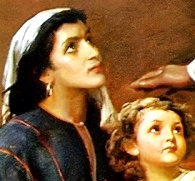
Hannah presents Samuel to Eli
Hannah's story has three parts:
- Hannah is childless,tormented by Peninn'nah, her husband's other wife, who has many children.
- Hannah's vow On a visit to God's shrine at Shiloh Hannah promises that, if she has a son, she will dedicate him as a Nazirite. Eli the priest thinks she is drunk. She convinces him she is not. He prays that God will grant her wish.
- Hannah fulfils her vow. Hannah has a son, Samuel. She gives her little son to the priests at Shiloh, but visits him every year, with
 a linen garment, an 'ephod' which marks her son as having priestly status.
a linen garment, an 'ephod' which marks her son as having priestly status. - You'll find the Bible text at the end of this page
Hannah is childless and unhappy
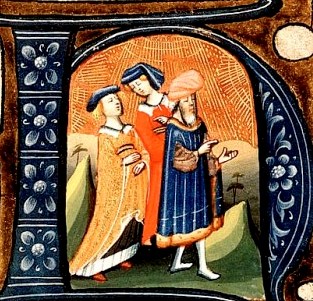
Elkahah, Peninnah and Hannah, from a medieval manuscript
Who was Hannah?
Hannah was a young woman married to a man called Elkanah. He loved her tenderly and she loved him.
But there was a fly in the ointment. He had another wife, Penin'nah, not loved but remarkably fertile (this story is set between the lawless period of the Judges and the more settled time of King David; it was still common for a man to have several wives, as it had been in the time of the Genesis stories).
While Hannah has never had a child, Penin'nah was surrounded by both sons and daughters.
Penin'nah saw her numerous children as her glory, and indeed they were.
She thought they should have made her the apple of her husband's eye. They did not.
Elkanah was deeply in love with the barren wife Hannah, instead of the fertile Penin'nah.
One can sympathise with her pain. But jealousy can make a woman cruel, and Penin'nah was no exception. She tormented Hannah about her lack of children. The Bible text says she provoked Hannah severely, irritating her constantly by mocking Hannah's lack of children.
This went on for years, especially at those time that Hannah prayed for children at the holy shrine at Shiloh, about twenty miles north of Jerusalem.
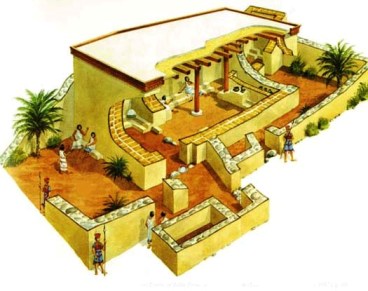
Reconstruction of the shrine/temple at Tel Qasile; the shrine Hannah visited may have been similiar, though probably on a more modest scale
One year when these three people were at Shiloh, Elkanah tried clumsily to comfort Hannah: 'aren't I more to you than ten sons?' he asked.
Hannah's response is not recorded. But once again she presented herself at the shrine and began her prayer.
The shrine/temple had seats beside the door, and on one of these sat Eli, the shrine's priest. When Hannah began to pray he saw her deep distress, but she prayed silently so that he did not hear her prayer.
The vow at Shiloh
1 Samuel 9-19
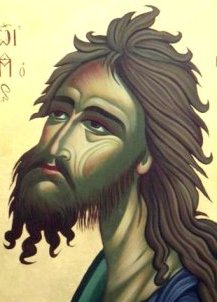
Icon of a Nazirite
Why did she pray silently? Because she was making a vow to God.
At that time a husband could rescind any vow his wife made if he did so within a day of the vow being made. Hannah, desperate, did not want this to happen, so she mouthed the words without actually speaking them aloud.
What was this strange vow?
That if God gave her a son, she would give this son back to God by dedicated him as a Nazirite, a holy man sworn to serve God all his life. 'He shall drink neither wine nor intoxicants, and no razor shall touch his head.' Verse 11.
If Elkanah had heard this vow, he would surely have objected. The boy after all would be his son as well as hers.
So she mouthed the words silently. (It is worth noting that at that time a clever deception was admired.)
Eli the priest, watching her, assumed she was drunk – there was a fair amount of feasting at festival time. He was outraged that she would approach the shine intoxicated, and said so, telling her she was making a drunken spectacle of herself.
Not so, she replied. She was deeply unhappy but certainly not drunk.
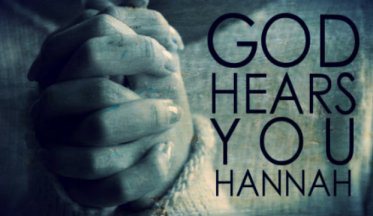 Mollified, Eli blessed her and prayed that her request might be granted.
Mollified, Eli blessed her and prayed that her request might be granted.
His words seemed to have a profound effect on her. She was convinced she would conceive at last. And indeed she did. In due time she bore a son.
Only then did she tell her husband Elkinah about her vow.
She was nervous, as well she might be, because according to the words of the vow she was obliged to hand over this newborn baby to the priests at the shrine.
She honours her promise
1 Samuel 19-28, 2:1-10, 18-21
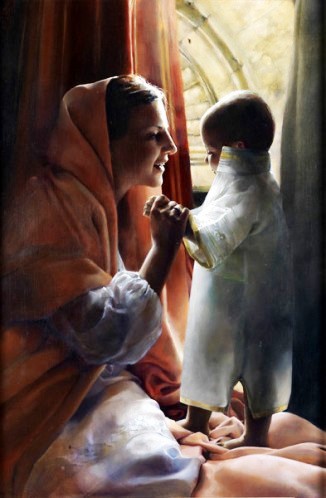
For This Child I Prayed, by Elspeth Young
Elkinah's reaction is not recorded. It cannot have been favourable.
Perhaps to mollify him, she made a compromise. She would keep the baby until he was weaned at about three years. This would give him a better chance of surviving the separation from his family. Only then would she take him to be given to the priests at Shiloh.
This she did.
When the time came that the little boy was weaned, she took him to Shiloh, just as she had promised, and dedicated the boy to God's service in a special ceremony.
Even at this stage she could have redeemed her vow by paying a sum of money to the priests at Shiloh, but she did not choose to do this. She was a woman who knew her own mind, and so she stuck to her original intention.
Hannah thanks God
At the time, Hannah made a special prayer of thanksgiving to God (see the Song of Hannah below).
- This song has special significance for Christians: the Magnificat, spoken by Mary the mother of Jesus and recorded in Luke's gospel, is modelled on the Song of Hannah.
That was not the end of the story. The Bible records that Hannah used to visit her son at Shiloh every year, taking a special gift she had made herself: a little linen ephod for the boy, presumably in a bigger size each year.
Wearing this garment marked Samuel as being of a priestly status.
And she was blessed with more children: three sons and two daughters, no less.
There is no further mention of Penin'nah….
What do the names in the story mean?
Hannah means 'God has favoured me' (with a child)
Penin'nah means 'a precious stone', something like coral or pearl – in other words, beautiful but hard and cold
Elkanah means 'bought/owned by God'
Samuel means 'God heard' (Hannah's prayer)
Main themes of the story
- Don't give up hope. God is listening. Remember that there is purpose in everything God does, even if we don't see what it is.
- Kindness or malice? It's our choice. The main story is about the special nature of Samuel's birth, but it's also about the way women can be cruel to one another. Hannah has no child. She desperately wants one. Penin'nah has many children. Does she sympathise with Hannah and pity her pain? No. She enjoys rubbing salt into Hannah's wounded heart.
The Bible text
1 Samuel 1-28, 2:1-10, 18-21
1 There was a certain man of Ramatha'im-zo'phim of the hill country of E'phraim, whose name was Elka'nah the son of Jero'ham, son of Eli'hu, son of Tohu, son of Zuph, an E'phraimite. 2 He had two wives; the name of the one was Hannah, and the name of the other Penin'nah. And Penin'nah had children, but Hannah had no children. 3 Now this man used to go up year by year from his city to worship and to sacrifice to the LORD of hosts at Shiloh, where the two sons of Eli, Hophni and Phin'ehas, were priests of the LORD. 4 On the day when Elka'nah sacrificed, he would give portions to Penin'nah his wife and to all her sons and daughters; 5 but to Hannah he gave a double portion because he loved her, although the LORD had closed her womb. 6 And her rival used to provoke her sorely, to irritate her, because the LORD had closed her womb. 7 So it went on year by year; as often as she went up to the house of the LORD, she used to provoke her. Therefore Hannah wept and would not eat. 8 And Elka'nah, her husband, said to her, "Hannah, why do you weep? And why do you not eat? And why is your heart sad? Am I not more to you than ten sons?" 9 After they had eaten and drunk in Shiloh, Hannah rose. Now Eli the priest was sitting on the seat beside the doorpost of the temple of the LORD. 10 She was deeply distressed and prayed to the LORD, and wept bitterly. 11 And she vowed a vow and said, "O LORD of hosts, if thou wilt indeed look on the affliction of thy maidservant, and remember me, and not forget thy maidservant, but wilt give to thy maidservant a son, then I will give him to the LORD all the days of his life, and no razor shall touch his head." 12 As she continued praying before the LORD, Eli observed her mouth. 13 Hannah was speaking in her heart; only her lips moved, and her voice was not heard; therefore Eli took her to be a drunken woman. 14 And Eli said to her, "How long will you be drunken? Put away your wine from you." 15 But Hannah answered, "No, my lord, I am a woman sorely troubled; I have drunk neither wine nor strong drink, but I have been pouring out my soul before the LORD. 16 Do not regard your maidservant as a base woman, for all along I have been speaking out of my great anxiety and vexation." 17 Then Eli answered, "Go in peace, and the God of Israel grant your petition which you have made to him." 18 And she said, "Let your maidservant find favour in your eyes." Then the woman went her way and ate, and her countenance was no longer sad. 19 They rose early in the morning and worshiped before the LORD; then they went back to their house at Ramah. And Elka'nah knew Hannah his wife, and the LORD remembered her; 20 and in due time Hannah conceived and bore a son, and she called his name Samuel, for she said, "I have asked him of the LORD." 21 And the man Elka'nah and all his house went up to offer to the LORD the yearly sacrifice, and to pay his vow. 22 But Hannah did not go up, for she said to her husband, "As soon as the child is weaned, I will bring him, that he may appear in the presence of the LORD, and abide there for ever." 23 Elka'nah her husband said to her, "Do what seems best to you, wait until you have weaned him; only, may the LORD establish his word." So the woman remained and nursed her son, until she weaned him. 24 And when she had weaned him, she took him up with her, along with a three-year-old bull, an ephah of flour, and a skin of wine; and she brought him to the house of the LORD at Shiloh; and the child was young. 25 Then they slew the bull, and they brought the child to Eli. 26 And she said, "Oh, my lord! As you live, my lord, I am the woman who was standing here in your presence, praying to the LORD. 27 For this child I prayed; and the LORD has granted me my petition which I made to him. 28 Therefore I have lent him to the LORD; as long as he lives, he is lent to the LORD." And they worshiped the LORD there.
The Song of Hannah
1 Hannah also prayed and said, "My heart exults in the LORD; my strength is exalted in the LORD. My mouth derides my enemies, because I rejoice in thy salvation. 2 "There is none holy like the LORD, there is none besides thee; there is no rock like our God. 3 Talk no more so very proudly, let not arrogance come from your mouth; for the LORD is a God of knowledge, and by him actions are weighed. 4 The bows of the mighty are broken, but the feeble gird on strength. 5 Those who were full have hired themselves out for bread, but those who were hungry have ceased to hunger. The barren has borne seven, but she who has many children is forlorn. 6 The LORD kills and brings to life; he brings down to Sheol and raises up. 7 The LORD makes poor and makes rich; he brings low, he also exalts. 8 He raises up the poor from the dust; he lifts the needy from the ash heap, to make them sit with princes and inherit a seat of honour. For the pillars of the earth are the LORD'S, and on them he has set the world. 9 "He will guard the feet of his faithful ones; but the wicked shall be cut off in darkness; for not by might shall a man prevail. 10 The adversaries of the LORD shall be broken to pieces; against them he will thunder in heaven. The LORD will judge the ends of the earth; he will give strength to his king, and exalt the power of his anointed." 11 Then Elka'nah went home to Ramah. And the boy ministered to the LORD, in the presence of Eli the priest.
…and what happened then?
18 Samuel was ministering before the LORD, a boy wearing a linen ephod. 19 And his mother used to make for him a little robe and take it to him each year, when she went up with her husband to offer the yearly sacrifice. 20 Then Eli would bless Elka'nah and his wife, and say, "The LORD give you children by this woman for the loan which she lent to the LORD"; so then they would return to their home. 21 And the LORD visited Hannah, and she conceived and bore three sons and two daughters. And the boy Samuel grew in the presence of the LORD.
Paintings
Hannah presents Samuel to Eli
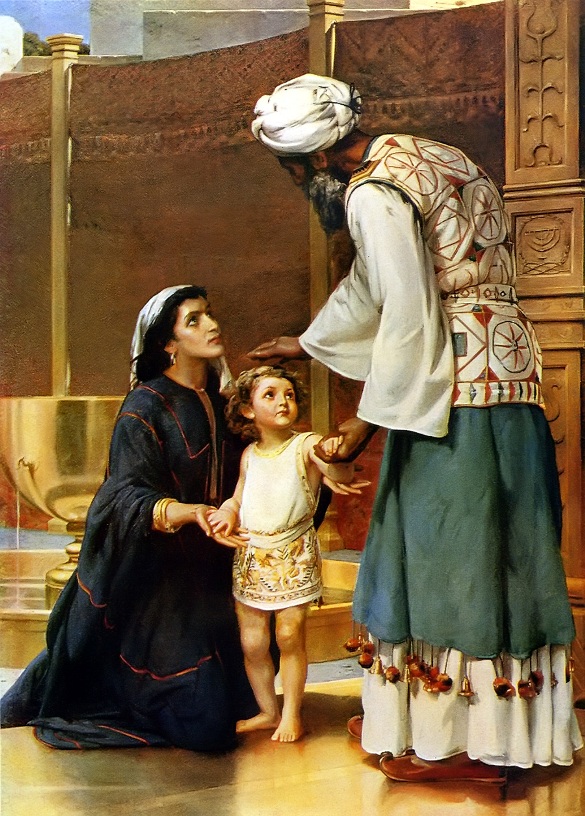
Samuel Dedicated by Hannah at the Temple by Frank W.W. Topham
Hannah presents Samuel to Eli
Gerbrand van den Eeckhout
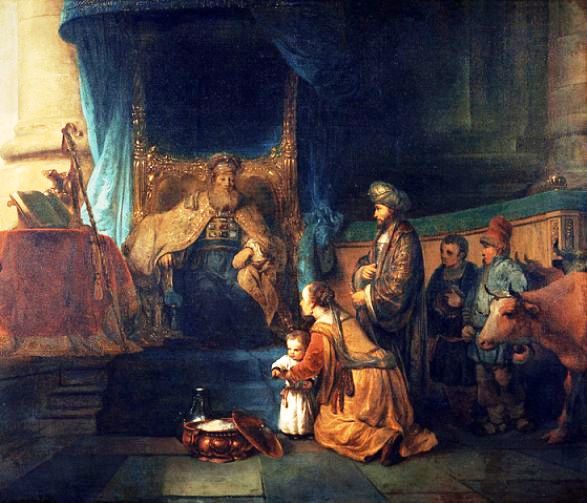
Hannah presents Samuel to Eli, Gerbrand van den Eeckhout
Elkanah and his wives, illuminated letter
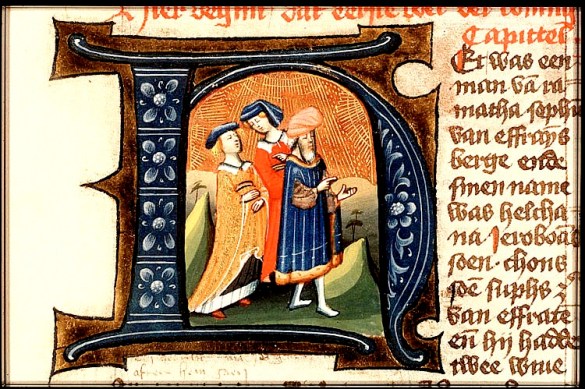
Elkanah and his wives, illuminated letter
Hannah in the temple, Rembrandt
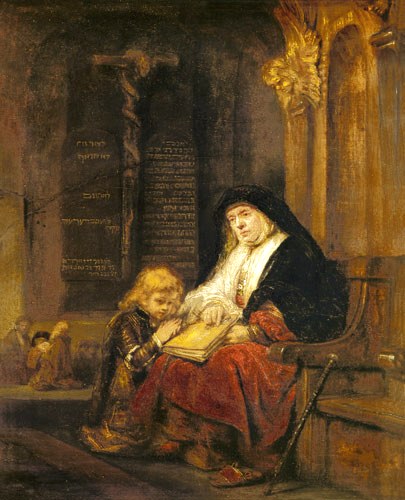
Hannah in the temple, Rembrandt
Hannah, Jan Victors
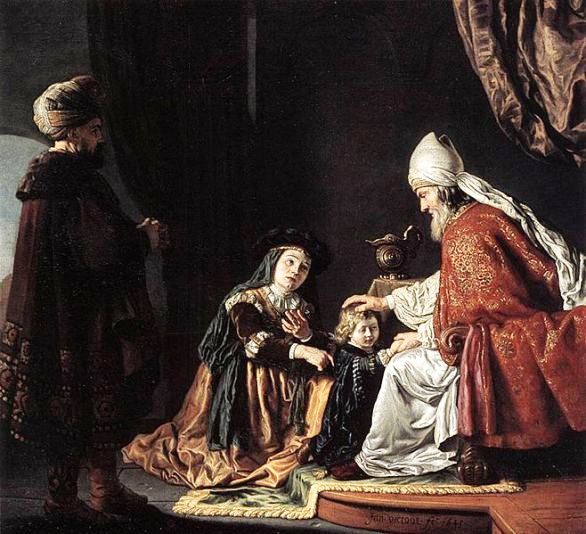
Hannah in the temple, Rembrandt
The High Priest and Hannah, James Tissot
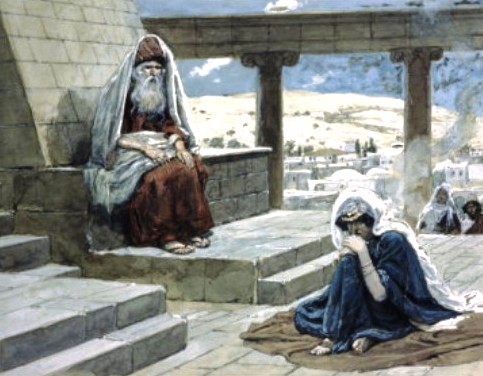
The High Priest and Hannah, James Tissot
Hannah's Prayer, Ilja Repin
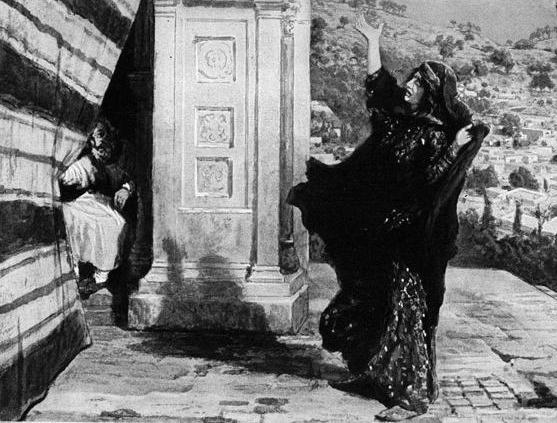
Hannah's Prayer, Ilja Repin
Read about more fascinating women of the Old and New Testaments
Source: http://womeninthebible.net/women-bible-old-new-testaments/hannah/
0 Response to "Hannah is an Easy Child She Rarely Cries and is Cooperative and Pleasant"
Post a Comment